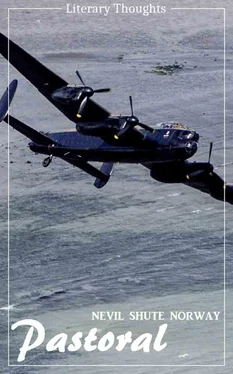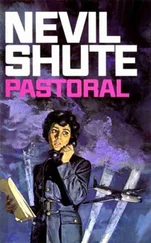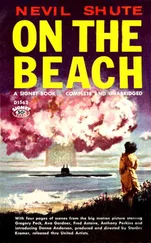‘So Pat thought,’ he said. ‘He told the maid to give it to the cat, if the cat would have it.’
‘What a shame!’
‘I’ll go out this afternoon and try and get another,’ Marshall said.
She turned to him. ‘Mr Marshall, do let me know what happens about your badger. You must be awfully well in with the country people here, to get a chance like that.’
He shook his head. ‘This chap sells motors in Great Portland Street.’
She wrinkled up her forehead in perplexity. ‘Sells motors? But you have to know the country frightfully well to find a badger.’
‘I know that.’ He paused. ‘Anyway, it should be rather fun.’
It was the second time that he had spoken to her about fun at Hartley aerodrome. She dropped her eyes. ‘Tell me about it when you come back,’ she said quietly.
‘Okay,’ he said. ‘I’ll give you all the lowdown on the sordid side of country life, lunch-time tomorrow.’
She took her coffee and the Daily Express, and crossed the room to a chair. Presently she got up, and went out to the signals office, and sat down at her bare deal table garnished with messages and signal forms in bulldog clips.
She was deeply disappointed. She was a country girl from the North Riding; her father was an auctioneer in Thirsk. Her uncle was rector of Thistleton, a little village in the hills near Helmsley; she knew country matters very well. She had a considerable knowledge of foxes; she had followed the hunt on various farm ponies, and she had crept out several times into the woods to stalk a vixen playing with her cubs before the earth; for one of these expeditions she had a blurred Brownie photograph to show. In all her experience of the country she had never seen a badger. This expedition in the moonlight night before the dawn was in her line exactly; she ached to be going out with Marshall in the morning. The very suggestion had been like a breath of fresh air to her, a reminder of a sane, decent, country world that she had left behind her in the north.
That was not possible, of course. A good WAAF officer, mindful of the honour of the Service, did not get out of bed at four o’clock in the morning to go roaming in the moonlit woods with an officer from her station. She spent an appreciable portion of her time endeavouring to restrain her aircraftwomen from that sort of thing, though it was true that none of them had ever thought to plead that they had a date with a badger.
She stared disconsolately at the signal pad before her. The fault, she felt, in some way lay within herself. Hartley was a rotten station to be in, but there was fun to be got mere, good country fun, if you knew your way about and had the wit to find it. Peter Marshall seemed to have a lovely time; the pike yesterday, and now this ‘fox and badger in a quarter of an hour’ business. All she had managed so far was to go for rides upon her bicycle and, since the country was flat and she came from the hills, she didn’t think much of that.
It was a very quiet afternoon, with little flying in progress and nothing in particular happening. She took a little walk around her duties; passing the main telephone switchboard she looked in to see how L.A.W. Smeed was getting on. L.A.W. Smeed was sitting with head-phones on her hair and microphone upon her chest eating her black-market sweets and knitting a jumper for her next leave. She slipped the knitting down beside her chair when her officer appeared in the doorway.
‘Afternoon, Elsie,’ said Miss Robertson. ‘Let’s see your book.’
The girl handed her the log-book, written in pencil between ruled pencil columns; there were not many calls upon it. ‘Not very busy,’ said Miss Robertson.
‘No, ma’am. Real slack it’s been today.’
They chatted for a few minutes about the work. Then L.A.W. Smeed said. ‘Mind if I ask a question, ma’am?’
‘What is it?’ said Miss Robertson. She knew what it was likely to be: something to do with late leave, an attempt to short-circuit Flight Officer Stevens.
Elsie said: ‘Your name’s a funny one, isn’t it, Miss Robertson? Some of the girls were having an argument.’
The Section Officer said: ‘Gervase. It’s not a very common one.’
‘Gervase. I never knew anyone called that before. I think it’s ever so nice. What’s the other one, Miss Robertson—the L?’
‘Laura. There are plenty of those about.’
‘I know ever so many Lauras,’ said the telephonist, ‘but I never met a Gervase before. I do think that’s pretty. Are there many girls called Gervase where you come from?’
‘I don’t think so. I don’t think it’s a Yorkshire name particularly.’
‘Is that where your home is, Miss Robertson? I live in Clapham, just by Clapham South Underground.’
The officer said: ‘I come from a little place called Thirsk, in Yorkshire. But I don’t think Gervase is a Yorkshire name at all. Mother got it out of a book—Tennyson, or something.’
The telephone buzzed, and put an end to further confidences. Miss Robertson went on with her round.
Out in the country, by the river below Coldstone Mill, Marshall was assembling his little rod. He worked more absently than on the previous day, his mind equally divided between fishing and Section Officer Robertson. He wondered if the red plug would do the trick again or whether he should use a narrow-bodied thing that simulated a little alcoholic fish, unable to swim very well. He wondered if Section Officer Robertson really had a boy friend who was doing her dirt. It was quite possible that she had got mixed up with somebody at her last station; indeed, it would be rather queer if she had not, being as attractive as she was. Anyway, she was going to get mixed up with somebody on this one; he knew that very well already.
He wondered whether it was any good casting to the same place in the millpond for another pike, and he wondered very much what her name was. He had already discovered her initials from the file of postings to the station. He wondered how old she was; he was twenty-two himself and he was pretty sure that she was younger than that. If he could find out how long she had been a Section Officer, that might give him a line. But he could ask her that.
He began casting in a desultory way over the running water, but soon gave it up, and sat down on a stone and lit his pipe. Over his head the pigeons flapped and fluttered in and out of the trees, small clouds sailed slowly past on a blue sky, and once an early bee flew past his ear. Presently he got up and, smoking still, began to walk down the river, rod in hand. It was no good flogging the same place two days running, he thought.
He passed a couple of aircraftmen fishing where Gunnar had been on the previous day, and went on towards a pool at the next weir. Just above the pool he came on Sergeant Phillips sitting on a little stool, his float between the weed beds in mid-stream. The pilot paused beside him.
‘Done any good?’ he asked.
The sergeant shook his head. ‘Don’t seem to be nowt stirring. I reckon Gunnar must ha’ caught them all yesterday.’
‘How many did he get?’
‘Four.’
The pilot glanced back up the river. ‘I told Gunnar to see if he could borrow Sergeant Pilot Nutter’s little rifle, and we’d have a crack at those pigeons up by the mill.’
Aye, he was talking about that. He’s got the gun.’
‘We’ll have a crack at them one day.’
The sergeant nodded. ‘Make a change to get a pigeon for tea.’
Marshall left him, and went on to the weir. He cast for an hour above it and below but rose nothing; either there were no pike there or it was an off day when they would not feed. Presently he walked slowly back up-stream towards the mill, casting here and there as he went. At the mill he took down his rod, got on his bicycle, and rode back to the station.
Читать дальше












